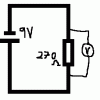When I measure a voltage of a 9V battery connected to a circuit and then disconnected, it varies. According to my electronics teacher, the voltage should be the same, since I am measuring the battery. I attached my circuit. (the V is the voltmeter) Is it because the circuit is so simple?


